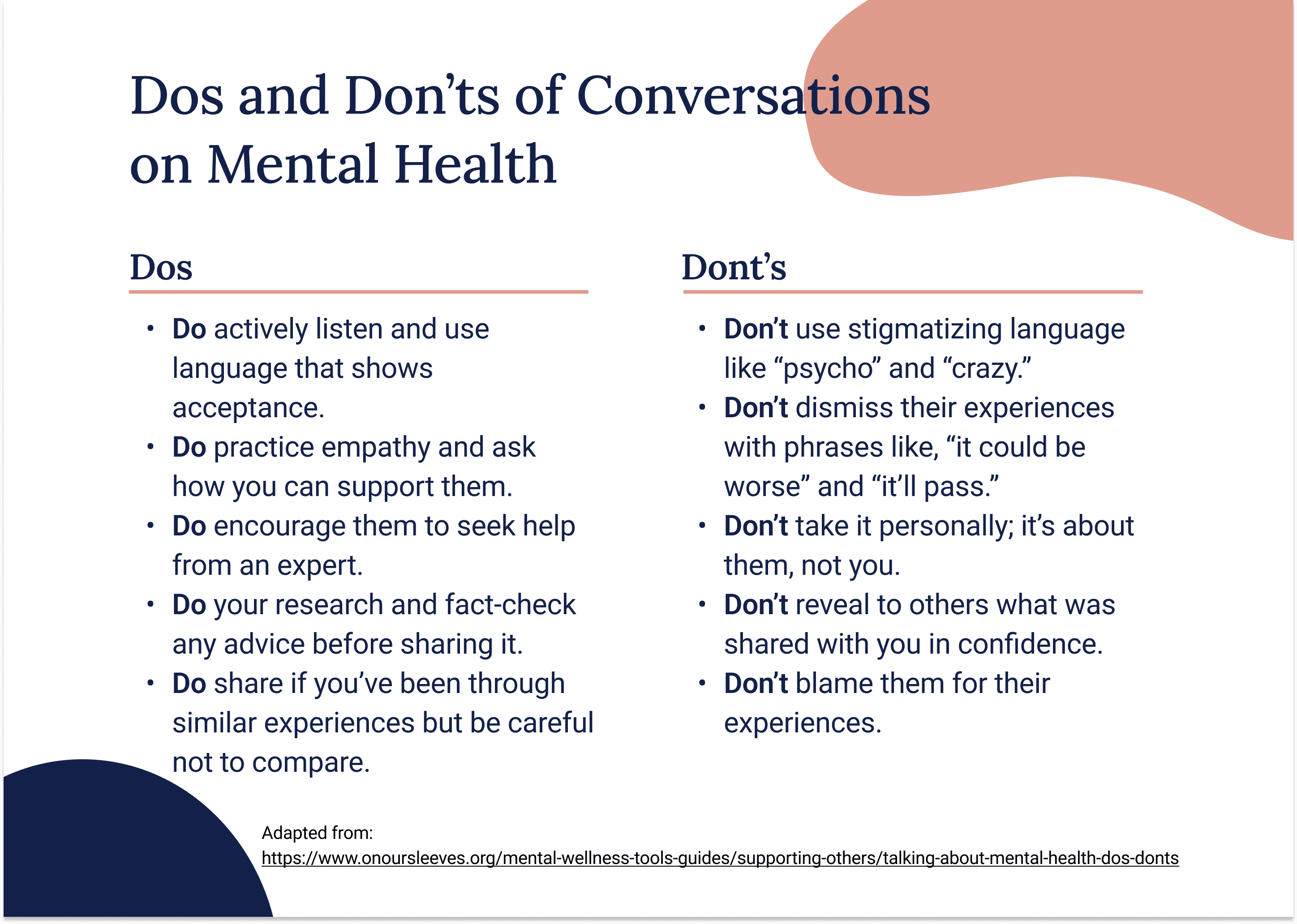
Aug 09, 2023, 4:00 am UTC
5 min
Created by
Mental Health Check: How to respond when someone talks to you about their mental health?
For many women, working on their mental health can be a lonely struggle. But with more than 1 in 5 women in the U.S. experiencing a mental health condition, such as depression, anxiety, post-traumatic stress disorder (PTSD) or an eating disorder, suffering in silence should no longer be the norm.
Whether it’s a friend, family member, or colleague, you can make a difference in their mental health journey by listening to and supporting them. This wmnHealth guide to having conversations around mental health at home and the workplace will empower you to respond empathetically and actively break the stigma surrounding mental health.
How should we talk about mental health?
For decades, social stigma, discrimination, and lack of understanding have stopped people from openly discussing their mental health. As doctors, celebrities, and mental health advocates work to shift this culture of silence, it becomes our job to give each mental health conversation around us the weight it deserves.
Here’s how you can play your part:
Listen up: Mental health struggles are real and should not be trivialized. When someone is sharing their experiences with you, give them your undivided attention, and use active listening skills to check if you’ve understood them correctly. Listening without interrupting or reacting is also recommended. Remember that this conversation is about them, not you, so try to stay calm and consciously pay attention.
Focus on language: Dismissive phrases and stigmatizing labels are harmful and stop people from disclosing a mental health problem and receiving help. It’s essential to choose your words carefully to avoid passing judgment. If you don’t understand what someone could be experiencing and have negative perceptions around mental health, trying to be empathetic and doing your own research may shift your outlook.
Encourage action: Mental health challenges often cause a ripple effect across all other aspects of a person’s life, so it’s important not to ignore them. If someone is hesitant to seek support actively, it may be helpful to make a comparison between mental illnesses and physical illnesses — we wouldn’t ignore the latter, so why ignore the former? Remember that health advice on social media platforms is laden with misinformation, so always refer people to credible organizations.

How can you support someone looking for help?
When someone opens up to you about their mental health, it’s an opportunity to show compassion, share accurate information, and guide their mental health journey so they can receive timely care.
Encourage them to see a professional: Finding a therapist can be daunting. You can talk them through the importance of getting counseling, or even help connect them with a professional by contacting therapists in the area, drafting emails they could send, or calling a hotline for more guidance.
Leave the door open: You can show your support by staying connected and following up. Sometimes it’s helpful to schedule regular phone calls or meetings, so there’s time carved out for their wellness. But a spontaneous message saying that you’re thinking of them will also do wonders in making someone else feel safe, supported, and loved.
Ask questions: Mental health is personal, and everyone copes differently. If you’re not worried about another person causing harm to themselves or others, it’s okay to give them space and ask questions like, “How can I help?” or “What do you need from me during this difficult time?” These questions will allow you to focus on what they find valuable.
Increase connection: While there’s no quick fix for overcoming mental health challenges, feeling connected — to people and the natural world — can have powerful effects on one’s well-being. You can invite the other person to meetups, encourage them to go on a walk or invest in a hobby that they find fulfilling.
Come up with a plan: If you’re unable to check up on them regularly or worried that they might be hiding their complete situation from you, developing a care and crisis plan could be helpful. This means working together to pin down the details of how they plan to work on their mental health and what they need to do if there’s ever an emergency.
How do you create a safe space for talking about mental health?
 Infographic by Cat Lau. (References below.)
Infographic by Cat Lau. (References below.)Mental Health @Work: How can you support colleagues at work?
Research has shown that disclosing mental health challenges to a supervisor or colleague can be a step toward getting workplace support and normalizing conversations around mental health. But there’s no denying how hard it is for employees to come forward with their struggles due to fear of discrimination, being perceived as incompetent at their job, or jeopardizing career opportunities.
Since there is so much at stake when someone at work chooses to trust you with their mental health struggles, it’s crucial that you:
Be supportive without prying: For many people, mental health is a personal matter. When these discussions take place at work, it’s important to respect boundaries and refrain from demanding more information than an employee may be willing to share. It’s also good to know when to stop bringing it up — if someone consistently does not want to talk about their mental health, leave the door open, metaphorically, to come to you when and if they want.
Offer on-the-job resources: Every workplace should invest in resources that support health and well-being. These tools can range from inclusive policies and employee assistance programs to healthcare benefits that offer access to a mental health professional.
Make workplace adjustments: Flexibility around how employees fulfil their roles can make a crucial difference in improving their mental health. You should work with an employee to see what changes in their schedule, work environment, and duties will allow them to feel less stressed or burned out.
How can you care for yourself while supporting someone with a mental illness?
Supporting a friend or loved one through their mental health journey can be emotionally taxing, and it’s important to take time for yourself and listen to your emotional needs.
Here are some tips on filling up your own cup:
Join a support group to openly share your experiences with family members, friends, and caregivers of others with mental health conditions.
Seek help from a professional if you’re constantly worried about your friend, family member, or colleague’s mental health.
Contact the Employee Assistance Plan at your workplace if you’re helping a colleague navigate mental health challenges and need someone to turn to.
Set realistic boundaries and communicate them. You are there to listen and support, but you can’t “rescue” or “fix” another person. It’s crucial not to create co-dependency but rather empower them to take healthy action around their mental health.
Resources
Time To Talk: What to say when you’re wanting to open up about your mental health, and how to support someone if you're on the other end of that conversation.
Starting a Conversation DIY tool: A worksheet with prompts to guide your conversation with a friend or loved one who is showing signs of poor mental health.
#YouCanTalk: How to recognize signs of mental health challenges and know when to reach out to offer support.
Mind UK:
A guide for parents and caregivers on talking to young people about their mental health.
A guide for employers on supporting staff experiencing mental health challenges.


